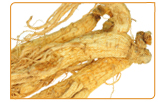The History of Ginseng as a Means to Combat Menopause Symptoms
If you’re suffering through menopause, you’d probably try anything to fight your symptoms — hormone replacement therapy, alternative medicines, even voodoo if you thought it could help. But did you know there’s a plant that has been used for centuries to fight the symptoms you’re facing? It’s called ginseng, and traditional cultures in Asia and North America have used it for centuries to treat women’s health issues, including menopause.
Intrigued? Keep reading to learn more about ginseng, and how it could help you to fight your menopause symptoms.
How Has Ginseng Been Used in the Past?
 In China, ginseng has been used since ancient times as a remedy for what ails the body as well as the soul. Menopausal women, especially, found that the herb provided relief to many of their symptoms. To this day, ginseng is still used for this purpose, along with its herbal cousin, Dong Quai.
In China, ginseng has been used since ancient times as a remedy for what ails the body as well as the soul. Menopausal women, especially, found that the herb provided relief to many of their symptoms. To this day, ginseng is still used for this purpose, along with its herbal cousin, Dong Quai.
Flip to the other side of the world, and you’ll find another culture that used ginseng to fight menopausal symptoms. For centuries, Native Americans on the eastern seaboard of North America used the herb for a host of maladies, including menopause. Now, keep reading to learn more about how ginseng works.
How Does Ginseng Work?
 Though many women have reported positive effects from using ginseng, not much is known about how it works in the human body. The root is thought to contain phytoestrogens, plant compounds that mimic estrogen. This is a plus for women with menopause, because estrogen decline during this transition are behind most of the condition’s symptoms.
Though many women have reported positive effects from using ginseng, not much is known about how it works in the human body. The root is thought to contain phytoestrogens, plant compounds that mimic estrogen. This is a plus for women with menopause, because estrogen decline during this transition are behind most of the condition’s symptoms.
Ginseng also contains ginsenosides, a compound thought to boost stamina and energy. This is good news for women suffering the effects of menopause insomnia and fatigue.
Okay, So What Are the Risks?
 Just as there is little scientific evidence to back up the claims of ginseng’s positive effects on menopause, little is known about the risks of taking the herb regularly. Some studies have connected phytoestrogens with an increased risk of breast cancer, but these are by no means conclusive. If you are considering taking ginseng as a daily supplement, it is best to talk with a qualified medical professional beforehand.
Just as there is little scientific evidence to back up the claims of ginseng’s positive effects on menopause, little is known about the risks of taking the herb regularly. Some studies have connected phytoestrogens with an increased risk of breast cancer, but these are by no means conclusive. If you are considering taking ginseng as a daily supplement, it is best to talk with a qualified medical professional beforehand.
Still unsure about ginseng? Get informed. Click the following link to learn more about ginseng for menopause.



























